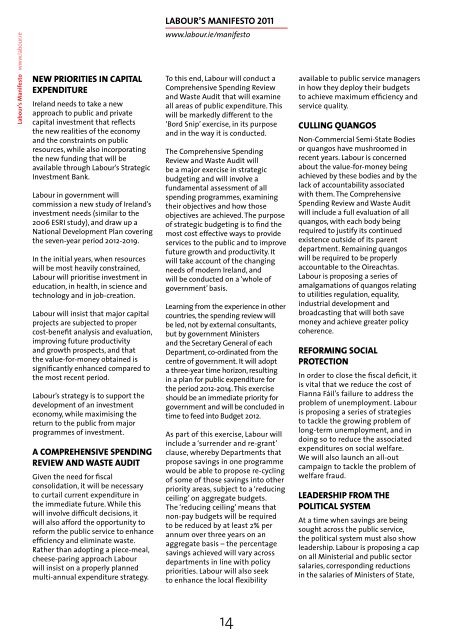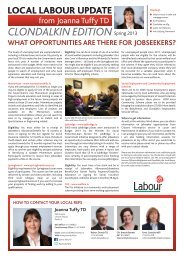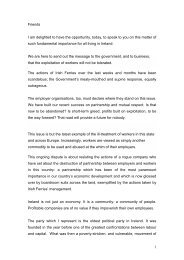Labour's Manifesto - The Labour Party
Labour's Manifesto - The Labour Party
Labour's Manifesto - The Labour Party
Create successful ePaper yourself
Turn your PDF publications into a flip-book with our unique Google optimized e-Paper software.
<strong>Labour</strong>’s manifesto 2011<br />
<strong>Labour</strong>’s <strong>Manifesto</strong> www.labour.ie<br />
New priorities in capital<br />
expenditure<br />
Ireland needs to take a new<br />
approach to public and private<br />
capital investment that reflects<br />
the new realities of the economy<br />
and the constraints on public<br />
resources, while also incorporating<br />
the new funding that will be<br />
available through <strong>Labour</strong>’s Strategic<br />
Investment Bank.<br />
<strong>Labour</strong> in government will<br />
commission a new study of Ireland’s<br />
investment needs (similar to the<br />
2006 ESRI study), and draw up a<br />
National Development Plan covering<br />
the seven-year period 2012-2019.<br />
In the initial years, when resources<br />
will be most heavily constrained,<br />
<strong>Labour</strong> will prioritise investment in<br />
education, in health, in science and<br />
technology and in job-creation.<br />
<strong>Labour</strong> will insist that major capital<br />
projects are subjected to proper<br />
cost-benefit analysis and evaluation,<br />
improving future productivity<br />
and growth prospects, and that<br />
the value-for-money obtained is<br />
significantly enhanced compared to<br />
the most recent period.<br />
<strong>Labour</strong>’s strategy is to support the<br />
development of an investment<br />
economy, while maximising the<br />
return to the public from major<br />
programmes of investment.<br />
A Comprehensive Spending<br />
Review and Waste Audit<br />
Given the need for fiscal<br />
consolidation, it will be necessary<br />
to curtail current expenditure in<br />
the immediate future. While this<br />
will involve difficult decisions, it<br />
will also afford the opportunity to<br />
reform the public service to enhance<br />
efficiency and eliminate waste.<br />
Rather than adopting a piece-meal,<br />
cheese-paring approach <strong>Labour</strong><br />
will insist on a properly planned<br />
multi-annual expenditure strategy.<br />
www.labour.ie/manifesto<br />
To this end, <strong>Labour</strong> will conduct a<br />
Comprehensive Spending Review<br />
and Waste Audit that will examine<br />
all areas of public expenditure. This<br />
will be markedly different to the<br />
‘Bord Snip’ exercise, in its purpose<br />
and in the way it is conducted.<br />
<strong>The</strong> Comprehensive Spending<br />
Review and Waste Audit will<br />
be a major exercise in strategic<br />
budgeting and will involve a<br />
fundamental assessment of all<br />
spending programmes, examining<br />
their objectives and how those<br />
objectives are achieved. <strong>The</strong> purpose<br />
of strategic budgeting is to find the<br />
most cost effective ways to provide<br />
services to the public and to improve<br />
future growth and productivity. It<br />
will take account of the changing<br />
needs of modern Ireland, and<br />
will be conducted on a ‘whole of<br />
government’ basis.<br />
Learning from the experience in other<br />
countries, the spending review will<br />
be led, not by external consultants,<br />
but by government Ministers<br />
and the Secretary General of each<br />
Department, co-ordinated from the<br />
centre of government. It will adopt<br />
a three-year time horizon, resulting<br />
in a plan for public expenditure for<br />
the period 2012-2014. This exercise<br />
should be an immediate priority for<br />
government and will be concluded in<br />
time to feed into Budget 2012.<br />
As part of this exercise, <strong>Labour</strong> will<br />
include a ‘surrender and re-grant’<br />
clause, whereby Departments that<br />
propose savings in one programme<br />
would be able to propose re-cycling<br />
of some of those savings into other<br />
priority areas, subject to a ‘reducing<br />
ceiling’ on aggregate budgets.<br />
<strong>The</strong> ‘reducing ceiling’ means that<br />
non-pay budgets will be required<br />
to be reduced by at least 2% per<br />
annum over three years on an<br />
aggregate basis – the percentage<br />
savings achieved will vary across<br />
departments in line with policy<br />
priorities. <strong>Labour</strong> will also seek<br />
to enhance the local flexibility<br />
available to public service managers<br />
in how they deploy their budgets<br />
to achieve maximum efficiency and<br />
service quality.<br />
Culling quangos<br />
Non-Commercial Semi-State Bodies<br />
or quangos have mushroomed in<br />
recent years. <strong>Labour</strong> is concerned<br />
about the value-for-money being<br />
achieved by these bodies and by the<br />
lack of accountability associated<br />
with them. <strong>The</strong> Comprehensive<br />
Spending Review and Waste Audit<br />
will include a full evaluation of all<br />
quangos, with each body being<br />
required to justify its continued<br />
existence outside of its parent<br />
department. Remaining quangos<br />
will be required to be properly<br />
accountable to the Oireachtas.<br />
<strong>Labour</strong> is proposing a series of<br />
amalgamations of quangos relating<br />
to utilities regulation, equality,<br />
industrial development and<br />
broadcasting that will both save<br />
money and achieve greater policy<br />
coherence.<br />
Reforming social<br />
protection<br />
In order to close the fiscal deficit, it<br />
is vital that we reduce the cost of<br />
Fianna Fáil’s failure to address the<br />
problem of unemployment. <strong>Labour</strong><br />
is proposing a series of strategies<br />
to tackle the growing problem of<br />
long-term unemployment, and in<br />
doing so to reduce the associated<br />
expenditures on social welfare.<br />
We will also launch an all-out<br />
campaign to tackle the problem of<br />
welfare fraud.<br />
Leadership from the<br />
political system<br />
At a time when savings are being<br />
sought across the public service,<br />
the political system must also show<br />
leadership. <strong>Labour</strong> is proposing a cap<br />
on all Ministerial and public sector<br />
salaries, corresponding reductions<br />
in the salaries of Ministers of State,<br />
14
















